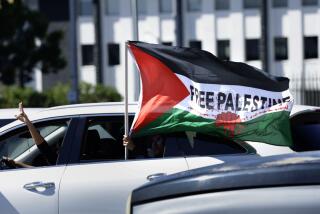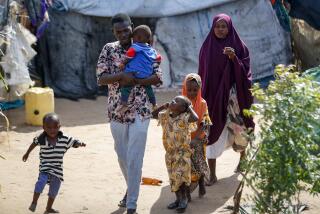COSTA MESA : Somaliland Native Tells of Horrors
- Share via
When the images of starving Somali children flicker from the television each night, Amina Adan worries about the horrors that are not being broadcast from her native land.
Adan, a new history instructor at Orange Coast College, was born in the Somaliland region of northern Somalia. And while most Western eyes focus on the war and famine ravaging the capital city of Mogadishu, she is hungry for word about the troubles in the north.
Without coverage by the American press, Adan must rely on occasional letters from friends carried out of the area by UNICEF workers and dated articles in obscure academic journals.
Life in Somaliland, as Adan described it during a recent interview on campus, is grim. Schools have long been closed, and jobs are scarce. There is no postal service. The water and sanitation works in some cities require extensive repairs. People sleep outdoors, fearful of exploding bombs and land mines. The famine is less acute in the north, but there is still not enough food for everyone.
In 1985, 500 people were executed in her hometown, and the Somaliland capital of Hargeysa was leveled four years ago in the heat of the nation’s bloody civil war, she said.
“Many people don’t recognize the situation. It’s terrible,” said Adan, a petite and intense woman in her 40s who is teaching American history and Western civilization at the Costa Mesa campus. “It’s been very bad for the last 10 years, but the press is not reporting what’s going on.”
Somaliland, which, unlike southern Somalia, was colonized by the British, has long sought independence from the rest of the horn of Africa nation. Adan complained that the West, too, has largely ignored her people’s demand for autonomy.
“Croatians, Latvians and others are recognized when they wanted self-determination. Why aren’t the people of Somaliland recognized?” she said. “We’re not European; we’re African.”
In fact, Adan said, some of the famine and chaos that now exists could have been prevented if the world had paid more attention to the violence that occurred in Somaliland throughout the 1980s. And while she is grateful for the international response to the situation, she said what is needed is long-term aid that goes beyond simply giving food.
“Be concerned about the hunger. That’s important. But also help the people who are trying to build a new country and a new (democratic) society,” she said.
Adan has been living in the United States on and off since the mid-1970s, when she arrived to study history. She went back to Somalia to teach in the mid-1980s but returned to California in 1987 as a graduate student at UCLA. She is now working toward a doctorate in history at UCLA and lives in West Los Angeles with her American-born son, Raage, 11.
The situation prompted Raage and his mother to consider sending a letter to President Bush. “He wanted to tell (the President) to help the Somalis,” she said.
More to Read
Sign up for Essential California
The most important California stories and recommendations in your inbox every morning.
You may occasionally receive promotional content from the Los Angeles Times.














